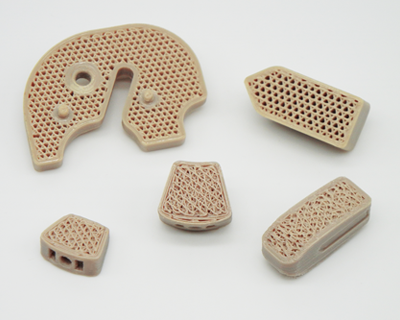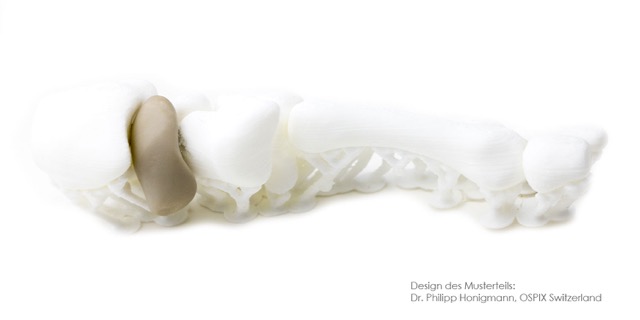FossiLabs, a US-based medical 3D printing start-up, has announced the launch of its FFF 3D printed bone-like scaffolding structures using a porous PEEK material. Reportedly the first ‘fully’ porous 3D printed PEEK porous medical implants, the bone-like structures are designed to be used within implantable devices using Fossilabs’ proprietary hardware and software.
Todd Reith, Founder and President at FossiLabs, explained, “Using 3D printing technology makes it possible to create a porous structure that would not be possible using traditional methods.”
“The increased surface area and the full porosity encourage new bone on-growth and in-growth of the implant, leading to greater integration strength. Add hydroxyapatite (HA) nanocoating, now you have something unmatched in the industry.”

Applications of 3D printed PEEK in the medical sector
Founded in 2017 and headquartered in West Chester, Pennsylvania, FossiLabs is an R&D lab focused on the development of 3D printed PEEK medical implant devices. PEEK is a thermoplastic polymer that offers a unique combination of high-performance characteristics, with high chemical resistance and durability.
In 3D printing, PEEK has seen consistent applications within the medical field, used in the production of passive exoskeletons, implants and devices used for the skull and the hand, and to help accelerate bone regeneration. Furthermore, in August 2019, German medical 3D printing startup Kumovis launched its R1 3D printer specifically for PEEK medical applications.

Enhancing medical devices with 3D printed bone-like structures
FossiLabs has developed a proprietary process offering FFF 3D printed medical implants with porous bone-like structures in PEEK. This is intended to benefit existing implantable devices where bone growth may be desired, providing faster osseointegration (the connection between living bone and an artificial implant).
The company claims that previously, product offerings have only had surface porosity or windows within defined layers, however with its proprietary process, it is now possible to 3D print solid or defined porous structures ‘anywhere within the 3D space’.
Using its 3D printing technology, materials, and software, FossiLab is able to identify solid and controlled bone-like macroporosity regions within existing client medical models. This helps to provide control of solids and variable levels of porosity. The desired bone growth areas can then be defined and 3D printed in PEEK, and is intended primarily for use with spacers and cages for the spine.
Having established a proof of concept, FossiLabs is now seeking medical device companies to license its technology and enhance its existing product lines.
Subscribe to the 3D Printing Industry newsletter for the latest news in additive manufacturing. You can also stay connected by following us on Twitter and liking us on Facebook.
Looking for a career in additive manufacturing? Visit 3D Printing Jobs for a selection of roles in the industry.
Featured image shows FossiLab 3D printed medical devices. Photo via FossiLab.


